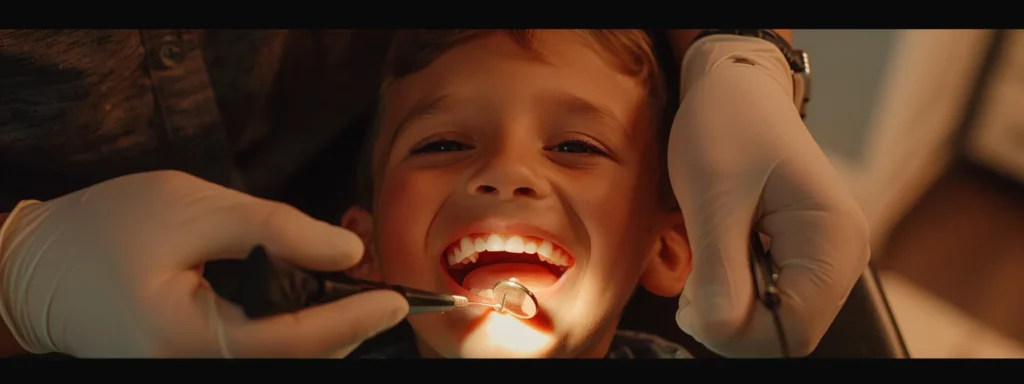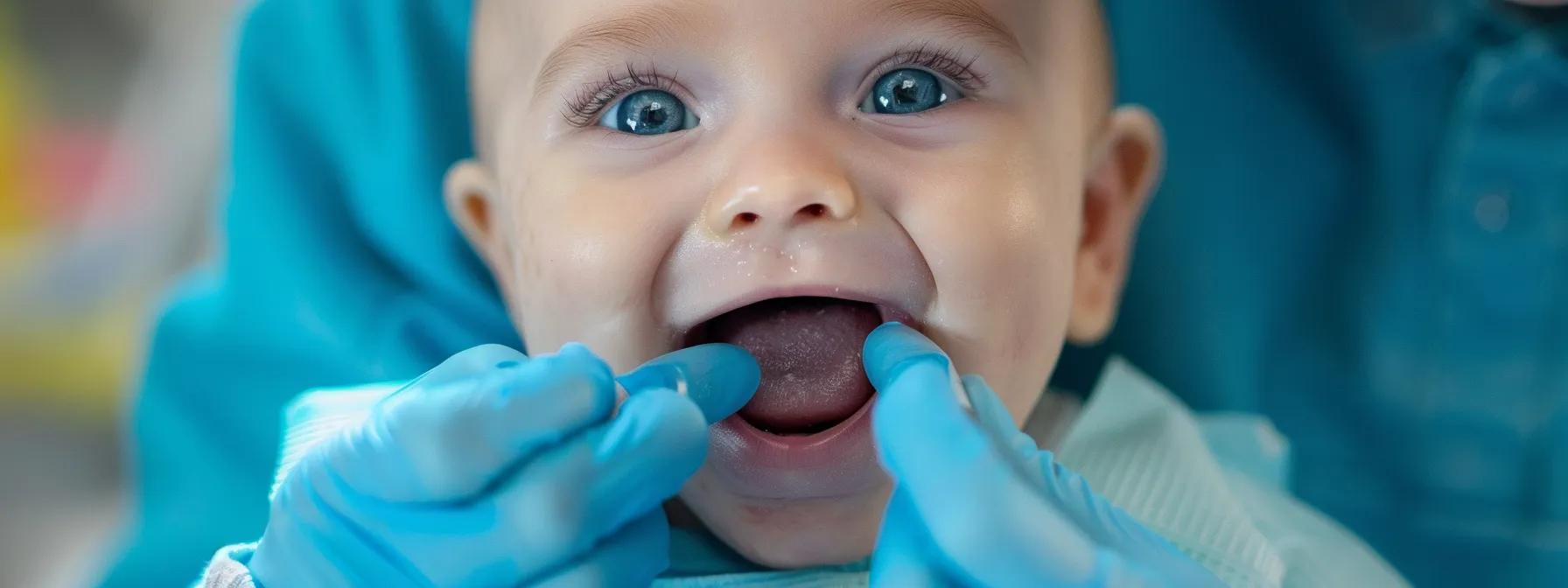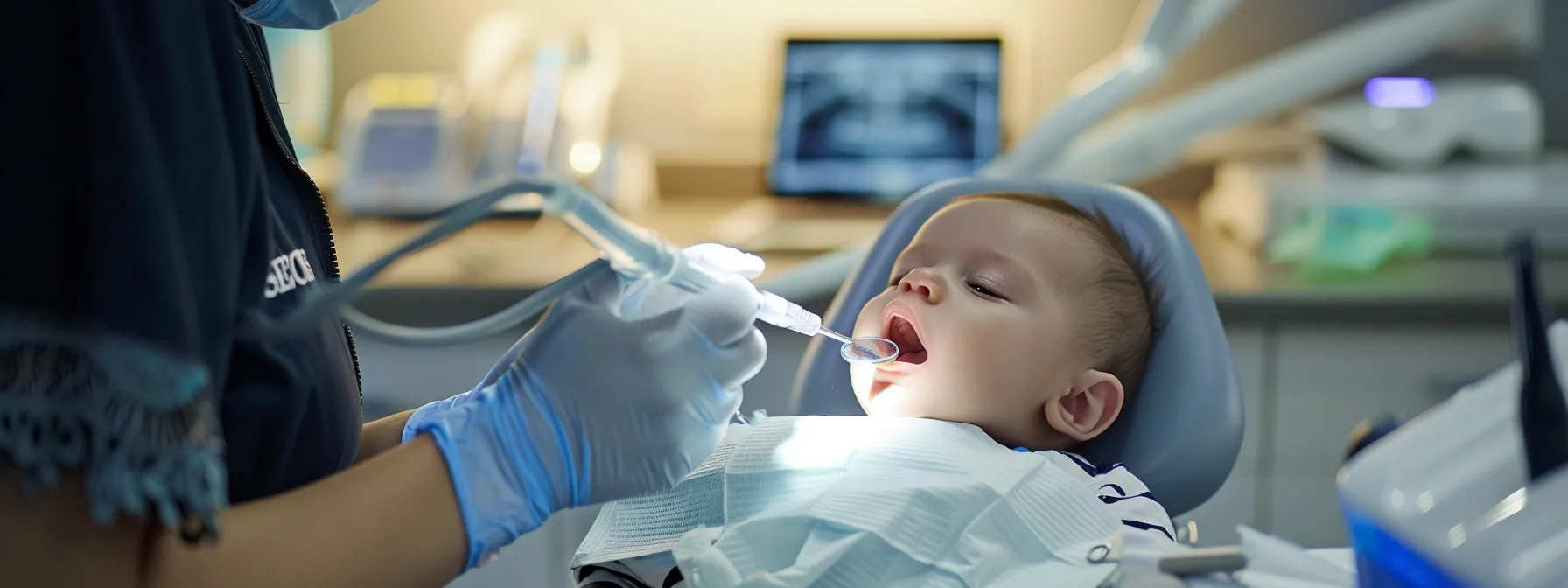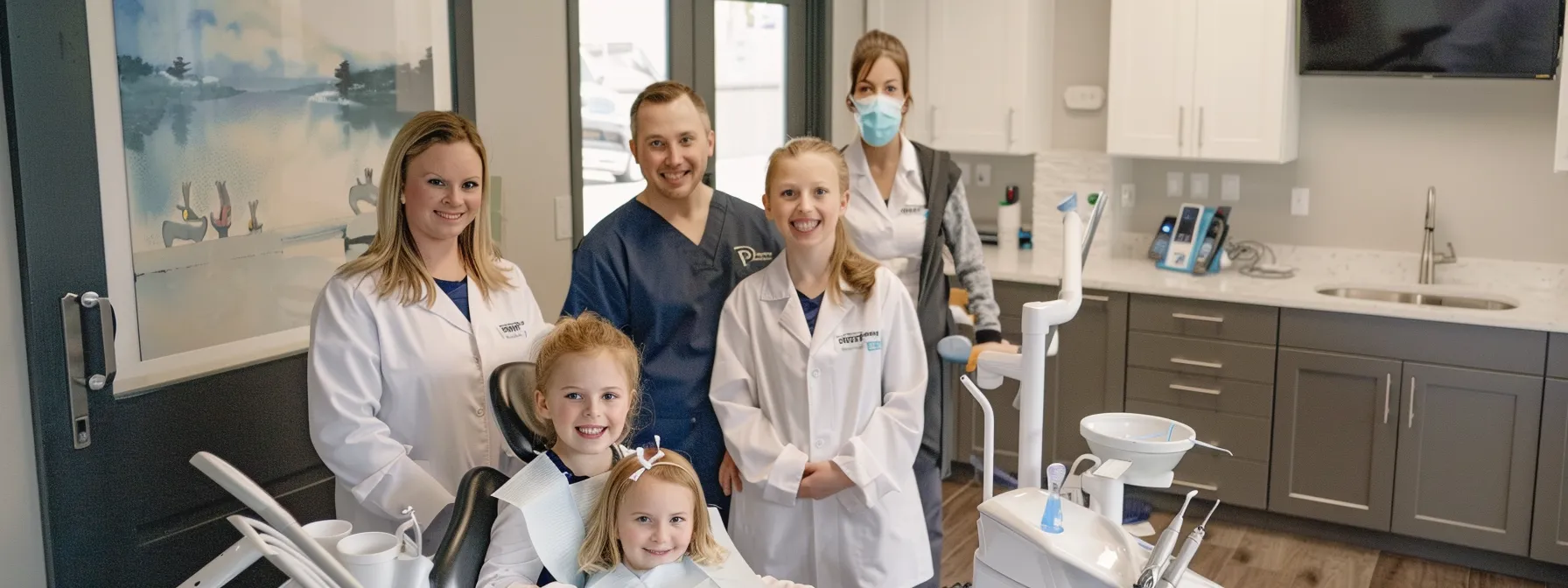
Comprehensive Guide to Tongue and Lip Tie in Leawood With Starting Point Pediatric Dentistry & Orthodontics — Starting Point Pediatric Dentistry & Orthodontics offers expert care for tongue and lip ties in Leawood. These conditions can affect an infant’s ability to feed properly and may lead to speech issues later in life. Dr. Kerston Cowger and her team use advanced techniques to diagnose and treat both tongue tie and lip tie in Leawood, ensuring optimal oral health for young patients.
In this comprehensive guide, readers will discover the importance of early intervention and learn about the various treatment options available at Starting Point Pediatric Dentistry & Orthodontics. Keep reading to gain valuable insights into frenectomy or tongue and lip tie care, from diagnosis to aftercare, without the need for excessive advertising.
- Understanding Tongue and Lip Ties in Infants
- Diagnosing Tongue and Lip Tie in Leawood at Starting Point Pediatric Dentistry & Orthodontics
- The Importance of Treating Tongue and Lip Ties Early
- Lip Tie Revision Procedures in Leawood
- Comprehensive Aftercare for Tongue and Lip Tie Revision
- Choosing Starting Point Pediatric Dentistry & Orthodontics for Your Child’s Care
- Frequently Asked Questions
- Conclusion
Understanding Tongue and Lip Ties in Infants

Tongue and lip ties are common oral conditions that can affect infants, potentially impacting their feeding and development. These conditions involve the restriction of tongue or lip movement due to tight connective tissue. Parents and caregivers should be aware of the signs and symptoms associated with tongue and lip tie revision, as early detection can lead to timely intervention. Understanding the nature of these conditions, their effects on feeding, and how they relate to an infant’s gums and overall oral health is crucial. For those seeking guidance, lactation consultants and pediatric dentists specializing in tongue and lip tie in Leawood can provide valuable insights and treatment options.
What Is a Tongue Tie?
A tongue tie, also known as ankyloglossia, is a congenital condition where the lingual frenulum, the band of tissue connecting the tongue to the floor of the mouth, is unusually short or tight. This restriction can limit the tongue’s range of motion, potentially affecting an infant’s ability to breastfeed effectively and causing discomfort for both the baby and mother.
Tongue ties can vary in severity and may impact an infant’s oral health and development. In some cases, this condition can lead to feeding difficulties, including inefficient milk transfer and nipple pain for the mother. Pediatric health professionals, including dentists specializing in infant oral care, can diagnose and treat tongue ties to improve overall oral function and reduce associated complications.
Identifying a Lip Tie in Leawood to Help Your Infant
A lip tie, similar to ankyloglossia, occurs when the tissue connecting the upper lip to the gum is overly tight or thick. Parents can identify a lip tie in Leawood by gently lifting their infant’s upper lip and observing if the frenulum restricts movement or creates a noticeable indentation on the gum line. This condition may require attention from a pediatric dentist or lactation specialist.
Lip ties can interfere with breastfeeding, potentially causing poor latch, inefficient milk transfer, and discomfort for both mother and baby. In some cases, a frenectomy or other forms of therapy may be recommended to address the issue. Early identification and intervention can help improve feeding outcomes and support healthy oral development.
How Tongue and Lip Ties Affect Feeding
Tongue and lip ties can significantly impact an infant’s ability to feed effectively. These conditions restrict the movement of the tongue or lip, making it challenging for babies to create a proper latch on the breast or bottle. The tight tissue can prevent the infant from extending their tongue or lifting their upper lip adequately, leading to inefficient milk transfer and potential frustration during feeding sessions.
Infants with tongue or lip ties may experience difficulties in maintaining suction and swallowing, which can result in poor weight gain and discomfort for both the baby and mother. Pediatric dentistry specialists can assess the severity of these conditions and recommend appropriate interventions to improve feeding outcomes. Early detection and treatment of tongue and lip ties can help prevent long-term oral health issues and support healthy tooth development.
Proper diagnosis is crucial for the effective treatment of tongue and lip ties. Starting Point Pediatric Dentistry & Orthodontics employs advanced techniques to accurately identify these conditions in infants.
Diagnosing Tongue and Lip Tie in Leawood at Starting Point Pediatric Dentistry & Orthodontics

Starting Point Pediatric Dentistry & Orthodontics in Leawood offers comprehensive care for infants with tongue and lip ties. The clinic’s expert team understands the impact these conditions can have on feeding, weight gain, and overall development. From the initial consultation to creating personalized care plans, the specialists consider factors such as pregnancy history and breast milk production.
They employ advanced diagnostic techniques, including laser assessment, to ensure accurate identification of tongue and lip tie in Leawood. This thorough approach allows the clinic to provide tailored treatment options that address each patient’s unique needs, promoting optimal oral health and feeding success.
Initial Consultation Process
Starting Point Pediatric Dentistry & Orthodontics initiates the diagnostic process with a comprehensive initial consultation. During this visit, specialists assess the infant’s oral anatomy, paying close attention to the frenulum and its impact on tongue and lip movement. They also discuss any breastfeeding difficulties or concerns about milk transfer with parents.
The consultation involves a thorough examination to rule out other potential causes of feeding issues, such as sleep apnea or underlying diseases. Specialists gather detailed information about the infant’s feeding patterns, weight gain, and overall development. This holistic approach ensures an accurate diagnosis and appropriate treatment plan:
- Review of medical history and feeding challenges
- Physical examination of oral structures
- Assessment of tongue and lip mobility
- Discussion of treatment options and expected outcomes
- Formulation of a personalized care plan
Expert Diagnosis Techniques
Starting Point Pediatric Dentistry & Orthodontics employs advanced diagnostic techniques to assess tongue and lip ties accurately. Specialists evaluate the range of motion of the tongue and lips, considering how restrictions might impact feeding, speech, and oral hygiene. They also examine the potential long-term effects on tooth development and decay risk.
The clinic utilizes state-of-the-art imaging technology to visualize the frenulum’s attachment and thickness. This detailed assessment helps determine if surgery is necessary and guides the planning of any required procedures. Specialists consider factors such as the need for anesthesia and potential impacts on sleep patterns when recommending treatment options.
Creating a Personalized Care Plan
Starting Point Pediatric Dentistry & Orthodontics creates personalized care plans for infants with tongue and lip ties. These plans consider factors such as the infant’s weight, feeding difficulties, and potential risks of infection or mastitis for the mother. The health professional team collaborates with parents to develop a comprehensive approach that addresses both immediate concerns and long-term oral health goals.
The care plan may include recommendations for frenectomy, feeding therapy, or other interventions based on the severity of the tie and its impact on the infant’s development. Specialists at Starting Point Pediatric Dentistry & Orthodontics stay updated with the latest research, including information from reputable sources like the Mayo Clinic, to ensure their treatment recommendations are evidence-based and effective. The care plan is designed to be flexible, allowing for adjustments as the infant’s needs change over time:
- Assessment of tie severity and impact on feeding
- Recommendations for surgical intervention, if necessary
- Guidance on post-procedure care and exercises
- Referrals to lactation consultants or speech therapists
- Follow-up appointments to monitor progress and adjust treatment
Early identification of a tongue or lip tie in Leawood can significantly impact a child’s development. Timely treatment at Starting Point Pediatric Dentistry & Orthodontics sets the stage for improved oral function and overall health.
The Importance of Treating Tongue and Lip Ties Early

Research from the American Academy of Pediatrics emphasizes the significance of early intervention for tongue and lip ties in infants. These conditions can significantly impact feeding, potentially leading to difficulties with breastfeeding or the need for infant formula supplementation.
Early treatment is crucial for preventing long-term oral health concerns, including challenges with oral hygiene and potential bleeding during routine dental care. Timely intervention can also mitigate future speech development issues. Recognizing when to seek treatment for a child with tongue or lip ties is essential for parents and caregivers to ensure optimal oral health and overall development.
Impact on Feeding and Speech Development
Untreated tongue and lip ties can significantly impact an infant’s feeding abilities and speech development. A medical diagnosis from a pediatric dentist or lactation consultant may reveal difficulties in latching, milk transfer, and proper tongue movement, potentially necessitating the use of a nipple shield or a frenectomy in Kansas City. These issues can lead to inadequate nutrition and slow weight gain, increasing the risk of developmental delays.
Early intervention is crucial for addressing these concerns and preventing long-term complications. Parents should be aware of the potential impact on speech development, as restricted tongue movement can affect the formation of certain sounds. Seeking timely treatment can help ensure proper oral function and reduce the likelihood of future speech therapy needs.
Long-Term Oral Health Concerns
Untreated tongue and lip ties can lead to long-term oral health concerns beyond infancy. These conditions may contribute to the development of sleep apnea, affecting the child’s overall health and well-being. Inadequate tongue mobility can also impact proper nutrition and nursing habits, potentially leading to dental decay and misalignment of the upper teeth. Visit our page for more details on Frenectomy in Kansas City.
Early intervention through procedures like a frenectomy can significantly reduce these risks. By addressing tongue and lip ties promptly, parents can help ensure their child’s proper oral development and prevent future complications. Timely treatment supports optimal feeding, speech, and dental health outcomes.
When to Seek Treatment for Your Child
Parents should seek treatment for their child’s tongue or lip tie when they observe feeding difficulties, such as trouble latching onto the breast or bottle, or if the physician notes concerns during routine check-ups. Signs of a tight lingual frenulum may include a heart-shaped tongue tip, difficulty extending the tongue past the lower lip, or clicking sounds during feeding. Mothers experiencing breast engorgement or persistent nipple pain should also consult a healthcare professional.
Early intervention is crucial, as untreated tongue and lip ties can lead to long-term complications. If parents notice their infant struggling to maintain a proper latch, experiencing excessive gas, or developing skin irritation around the mouth, they should seek evaluation from a pediatric dentist or lactation specialist. Prompt treatment can prevent feeding challenges and support optimal oral development:
- Difficulty latching or maintaining suction during feeding
- Persistent nipple pain or damage for breastfeeding mothers
- Slow weight gain or failure to thrive
- Excessive gassiness or reflux symptoms
- Visible tethering of the tongue or upper lip
- Clicking sounds during nursing or bottle feeding
Early intervention can transform a child’s oral health and development. Let’s explore how lip tie revision procedures in Leawood offer effective solutions for this common issue.
Lip Tie Revision Procedures in Leawood

Starting Point Pediatric Dentistry & Orthodontics in Leawood offers advanced lip tie revision procedures for infants and children. These interventions address restricted lip movement, which can impact feeding and oral development. The process begins with a thorough physical examination, including assessment of the ear and surrounding structures.
Specialists consider factors such as hygiene practices and feeding methods, including the potential need for a feeding tube. A lactation consultant may be involved to provide comprehensive support throughout the treatment journey. The clinic’s approach ensures patients and families are well-prepared for the procedure, understand what to expect during the revision, and receive appropriate post-procedure care and support.
Preparing for a Lip Tie Revision
Starting Point Pediatric Dentistry & Orthodontics in Leawood ensures thorough preparation for lip tie revision procedures. The clinic’s specialists examine the infant’s oral anatomy, including the palate and neck area, to assess the extent of the lip tie and its potential impact on swallowing. They also consider the mother’s experience with breastfeeding and any associated discomfort.
Parents receive comprehensive guidance on pre-procedure care, including instructions on feeding and oral hygiene. The clinic’s team discusses the potential for minimal scarring and addresses any concerns about the procedure’s impact on the child’s overall oral health. This preparation phase helps families feel confident and well-informed before the revision.
- Detailed examination of oral structures
- Discussion of procedure benefits and risks
- Instructions for pre-procedure care
- Addressing parental concerns and questions
- Coordination with lactation consultants if needed
What to Expect During the Procedure
Starting Point Pediatric Dentistry & Orthodontics in Leawood performs lip tie revision procedures with precision and care. The clinic’s specialists use advanced techniques to minimize discomfort and ensure optimal outcomes. During the procedure, parents may be present to provide comfort to their child, and the use of a pacifier may be recommended for soothing purposes.
The clinic’s approach considers factors such as speech development and potential impacts on overall health, including the risk of diabetes, as indicated in recent cohort studies. Specialists at the clinic prioritize patient comfort and safety throughout the procedure, which typically takes only a few minutes to complete.
Post-Procedure Care and Support
Starting Point Pediatric Dentistry & Orthodontics in Leawood provides comprehensive post-procedure care and support for patients undergoing lip tie revision. The clinic’s team offers guidance on physical therapy exercises to promote proper healing and maintain the benefits of the procedure. Parents receive instructions on monitoring their child’s breathing and feeding patterns in the days following the procedure.
The clinic’s healthcare professionals work closely with families to ensure optimal recovery and address any concerns that may arise during the healing process. They may recommend follow-up appointments to assess progress and determine if additional orthodontic interventions are necessary. This ongoing support helps ensure the best possible outcomes for patients who have undergone lip tie revision procedures.
Successful lip tie revision marks the beginning of a transformative journey. Comprehensive aftercare ensures optimal healing and unlocks the full benefits of the procedure. For more detail, you can visit our page dedicated to frenectomy in Kansas City.
Comprehensive Aftercare for Tongue and Lip Tie Revision

Starting Point Pediatric Dentistry & Orthodontics in Leawood provides comprehensive aftercare for tongue and lip tie revisions, ensuring optimal healing and development. The clinic‘s approach addresses various aspects of recovery, including pain management, feeding techniques, and exercise routines. Parents receive guidance on using breast pumps to maintain milk supply during the healing process, as well as strategies to minimize noise and discomfort.
The clinic’s specialists monitor for potential speech delays and provide tailored exercises to promote proper oral function. Regular follow-up appointments allow for assessment of healing progress and adjustment of care plans, even considering factors such as the mother’s ovulation cycle when scheduling visits. This holistic approach supports families throughout the entire recovery journey, promoting successful outcomes for infants and children who have undergone tongue or lip tie revisions.
Healing Process and Pain Management
Starting Point Pediatric Dentistry & Orthodontics in Leawood provides expert guidance on the healing process following tongue and lip tie revisions. The clinic’s specialists conduct thorough exams to monitor the surgical site and ensure proper healing. They offer information on expected recovery timelines and signs of normal healing, helping parents navigate the post-procedure experience with confidence.
Pain management is a crucial aspect of aftercare, and the clinic recommends appropriate medicine to alleviate discomfort. Parents receive instructions on administering pain relief safely and effectively, including guidance on using a clean finger to apply topical treatments when necessary. The clinic’s approach emphasizes minimizing discomfort while promoting optimal healing.
Feeding Post-Revision: Tips and Tricks
Starting Point Pediatric Dentistry & Orthodontics in Leawood provides expert guidance on feeding techniques following tongue and lip tie revisions. The clinic’s specialists, including experienced surgeons, offer tailored advice to address potential challenges, such as failure to thrive. They emphasize the importance of proper latch and positioning, ensuring infants can effectively transfer milk without straining their cheeks or causing discomfort.
Parents receive comprehensive instructions on supporting their child’s feeding journey post-revision. The clinic may recommend specific tools, such as specially designed scissors for oral exercises, to aid in the recovery process. Families are encouraged to work closely with lactation consultants or doulas to optimize feeding techniques and ensure successful outcomes. The clinic’s approach focuses on promoting comfort and efficiency during feeding sessions:
- Proper positioning and latch techniques
- Gentle oral exercises to maintain revision benefits
- Monitoring milk transfer and weight gain
- Adjusting feeding schedules as needed
- Collaborating with lactation specialists for ongoing support
Exercises and Follow-Up Appointments
Starting Point Pediatric Dentistry & Orthodontics in Leawood emphasizes the importance of post-revision exercises and follow-up appointments for optimal recovery. The clinic’s primary care team provides detailed instructions on stretching exercises that target the roof of the mouth and surrounding areas affected by infant upper lip tie or newborn tongue and lip tie revisions. These exercises help maintain the benefits of the procedure and promote proper oral function.
The clinic’s policy includes scheduled follow-up appointments to monitor healing progress and assess the need for additional interventions. During these visits, specialists evaluate the revision site, discuss any concerns, and adjust the aftercare plan as necessary. This comprehensive approach ensures that families receive ongoing support throughout the recovery process, promoting successful outcomes for patients who have undergone tongue or lip tie revisions.
The journey to optimal oral health doesn’t end with tongue and lip tie revision. Starting Point Pediatric Dentistry & Orthodontics offers expert care to ensure your child’s ongoing well-being and development.
Choosing Starting Point Pediatric Dentistry & Orthodontics for Your Child’s Care

Starting Point Pediatric Dentistry & Orthodontics in Leawood offers specialized care for infants with tongue and lip ties, providing comprehensive treatment options for conditions such as infant lip tie and newborn lip tie. The clinic’s team of experienced specialists utilizes advanced techniques to diagnose and address these oral restrictions, ensuring optimal outcomes for young patients. Parents seeking expert care for tongue and lip ties in infants can benefit from the clinic’s success stories, which demonstrate the positive impact of their treatments. Scheduling a consultation is a straightforward process, allowing families to access the clinic’s expertise and begin their journey towards improved oral health for their children.
Why Choose Our Specialists in Leawood
Starting Point Pediatric Dentistry & Orthodontics in Leawood boasts a team of highly skilled specialists dedicated to treating tongue and lip ties in infants and children. These experts possess extensive experience in diagnosing and addressing various oral restrictions, utilizing state-of-the-art techniques to ensure optimal outcomes. The clinic’s commitment to staying at the forefront of pediatric dental care ensures that patients receive the most advanced and effective treatments available.
The specialists at Starting Point Pediatric Dentistry & Orthodontics prioritize personalized care, tailoring treatment plans to meet each child’s unique needs. Their comprehensive approach includes thorough evaluations, clear communication with families, and ongoing support throughout the treatment process. By choosing these specialists, parents can feel confident that their child will receive exceptional care from a team dedicated to improving oral health and overall well-being.
Success Stories From Parents
Parents who have chosen Starting Point Pediatric Dentistry & Orthodontics for their child’s tongue and lip tie care share inspiring success stories. Many report significant improvements in their infant’s feeding abilities, with mothers experiencing reduced discomfort during breastfeeding. These testimonials highlight the clinic‘s expertise in addressing complex cases and providing comprehensive support throughout the treatment process.
Families praise the clinic’s compassionate approach and the long-term benefits of early intervention. Parents often note improved speech development and reduced risk of dental issues as their children grow. These success stories underscore the positive impact of Starting Point Pediatric Dentistry & Orthodontics‘ specialized care on both infants and their families.
How to Schedule Your Consultation
Starting Point Pediatric Dentistry & Orthodontics in Leawood offers a streamlined process for scheduling consultations. Parents can contact the clinic directly via phone or through their user-friendly online booking system to arrange an appointment with a tongue and lip tie specialist.
The clinic’s staff guides families through the scheduling process, ensuring they understand what to expect during the initial consultation. They provide information on necessary documentation and help parents prepare for their child’s evaluation, making the experience as smooth and stress-free as possible.
Frequently Asked Questions
What are tongue and lip ties, and how do they affect infants?
Tongue and lip ties are congenital conditions where the tissue connecting the tongue to the floor of the mouth or the lip to the gum is too tight or thick. These conditions can restrict the movement of the tongue or lip, potentially causing difficulties with breastfeeding, speech, and oral hygiene. In infants, tongue and lip ties may lead to challenges in latching during breastfeeding, resulting in poor weight gain and discomfort for both baby and mother. These conditions can also affect an infant’s ability to swallow properly and may contribute to issues with digestion and reflux.
How does Starting Point Pediatric Dentistry & Orthodontics diagnose tongue and lip ties?
Starting Point Pediatric Dentistry & Orthodontics diagnoses tongue and lip ties through a comprehensive examination. A trained dentist or orthodontist visually inspects the tongue and lip, assessing their movement and attachment to surrounding tissues. They may also use specialized tools to measure the degree of restriction. The diagnosis process includes evaluating the patient’s symptoms, such as feeding difficulties in infants or speech issues in older children. The dental professional may also consider the child’s medical history and perform functional tests to determine how the tie affects oral movements and functions.
Why is early treatment of tongue and lip ties important?
Early treatment of tongue and lip ties is crucial for proper feeding and speech development in infants and young children. These conditions can hinder breastfeeding, causing discomfort for both mother and baby, and may lead to poor weight gain and nutritional deficiencies if left untreated. Addressing tongue and lip ties early also prevents potential long-term issues with speech articulation, oral hygiene, and dental development. Timely intervention allows for easier correction and reduces the risk of complications, ensuring better overall oral health and quality of life for the child.
What does a lip tie revision procedure involve?
A lip tie revision procedure involves releasing the tight tissue connecting the upper lip to the gum. The process begins with a thorough examination of the lip tie by a pediatric dentist or oral surgeon. Local anesthesia is typically applied to ensure the patient’s comfort during the procedure. The practitioner then uses sterile surgical scissors or a laser to carefully cut the restrictive tissue. This quick procedure allows for improved lip mobility and function. Afterward, the area may be sutured if necessary, and post-operative care instructions are provided to promote proper healing.
How long does recovery take after a tongue or lip tie revision?
Recovery time after a tongue or lip tie revision varies depending on the individual and the extent of the procedure. Most infants and young children experience minimal discomfort and can resume normal activities within 24 to 48 hours. Breastfeeding or bottle-feeding can usually be resumed immediately after the procedure. For older children and adults, recovery may take slightly longer, typically ranging from 3 to 7 days. During this time, patients may experience mild discomfort, swelling, and difficulty speaking or eating. Following post-operative care instructions and maintaining proper oral hygiene can help promote faster healing.
Conclusion
Starting Point Pediatric Dentistry & Orthodontics in Leawood offers expert care for tongue and lip ties, providing comprehensive diagnosis, treatment, and aftercare services. Early intervention for these conditions is crucial to prevent long-term oral health issues and support optimal feeding and speech development. The clinic’s specialists employ advanced techniques and personalized care plans to address each child’s unique needs, ensuring the best possible outcomes. By choosing Starting Point Pediatric Dentistry & Orthodontics, families gain access to experienced professionals who prioritize patient comfort and long-term oral health, making it an excellent choice for parents seeking specialized care for their children’s tongue and lip ties.
At Starting Point Pediatric Dentistry & Orthodontics, where we’re not just about straightening teeth, we create infectious smiles that brighten up Kansas City! If you’re hunting for a kids dentist in Leawood or a teen dentist in Leawood, consider your search over.
We offer cavity treatment in Leawood for tooth pain in Leawood, each one tailored to your individual needs – because when it comes to orthodontic care, we believe in a personalized approach. From tiny tots to terrific teens and fantastic families, our children’s dentist in Leawood offers consultations to all ages.
We’re committed to making radiant smiles accessible for everyone. That’s why our services are as wallet-friendly as they are high-quality. We accept almost all dental insurance and offer interest-free payment options. Military personnel and families with multiple braces-wearers even get special discounts. Our sports dentists in Leawood and orthodontists are not only experienced, but also specialized in providing dental mouthguards in Leawood and dental night guards in Leawood.
So, request an appointment here or call our clinic at 913-491-5044 and let us add some sparkle to your smile!